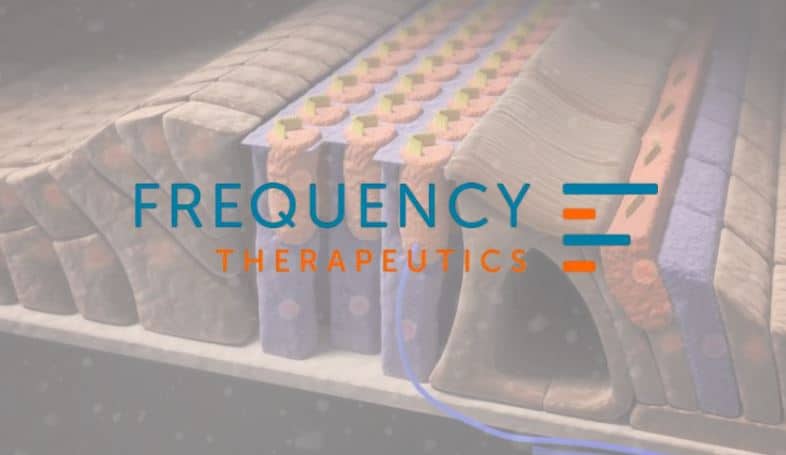LEXINGTON, MASSACHUSSETTS — Frequency Therapeutics, Inc. (Nasdaq: FREQ), a clinical-stage regenerative medicine company focused on developing therapeutics to activate a person’s innate potential to restore function, today announced that it has completed enrollment of its placebo-controlled Phase 2b study of FX-322 in adults with acquired sensorineural hearing loss (SNHL).
The FX-322-208 study, which enrolled 142 individuals, is designed to show improvement in a pre-specified measure of speech perception. The company plans to release study data in the first quarter of 2023.
“I am very pleased with our team’s execution of this study for the first potential treatment to restore hearing for those with SNHL. The 208 study was rigorously designed to ensure the stability of an individual’s hearing prior to entering the trial and to exclusively enroll those with the types hearing loss where we observed the strongest hearing improvement in prior FX-322 studies. FX-322 continues to have a favorable safety profile and we are aligned with FDA on the primary speech perception endpoint. With a successful outcome of this single-dose study, our intent is to advance the program into Phase 3 trials”
–David L. Lucchino, Frequency’s CEO
“We are grateful to all the study volunteers, clinicians and site staff for their time and commitment to this trial,” said David L. Lucchino, Frequency’s chief executive officer. “We believe the high level of interest from patients and healthcare providers in this study further demonstrates the need for a novel, disease modifying hearing loss treatment to expand the standard of care for the millions of individuals with sensorineural hearing loss.”
FX-322-208 Study Design
FX-322-208 is a prospective, randomized, double-blinded, placebo-controlled, multi-center Phase 2b study designed to evaluate the efficacy of a single administration of FX-322 on speech perception in subjects aged 18-65 with hearing loss associated with either noise-induced or permanent idiopathic sudden SNHL.
The study enrolled 142 participants, exceeding the original enrollment target of approximately 124, and is being conducted at 28 clinical sites across the US.
The company previously aligned with the US Food and Drug Administration (FDA) on the use of the specific speech perception primary endpoint. With improved speech perception, individuals may hear words more clearly, a critical unmet need for individuals with hearing loss. The FX-322-208 study is powered at 80% (significance level of 0.05) to observe a statistically significant and clinically meaningful improvement in speech perception at day 90 following dosing, with study responders defined as individuals exceeding the upper 95% confidence interval in the speech perception test. The Company has not publicly disclosed the specific test used for the primary endpoint to maximize the rigor of the study and mitigate potential bias.
During the study, subjects participate in a range of audiologic exams, including pure-tone audiometry, word recognition in quiet, word recognition in noise, the Tinnitus Functional Index (TFI), as well as multiple patient-reported outcome measures including Frequency’s proprietary patient reported outcome instrument (RADIAL) in acquired SNHL. All subjects are required to have a documented audiogram from at least six months prior to screening and most patients are evaluated over a 270-day period following dosing.
The study’s rigorous design includes a lead-in phase with multiple baseline measures. Subjects with instability of baseline tests are disqualified from participation in the study. Study audiometry testing sessions are recorded and monitored by third party audiologists to ensure consistency and identify any anomalies related to how tests were conducted.
In prior studies, the company observed the greatest concentration of speech perception improvements in individuals with permanent sudden or noise-induced sensorineural hearing loss in the moderate to lower severe hearing loss range. These learnings informed the design and inclusion criteria for the FX-322-208 study.
More than 200 individuals have been dosed with a single injection of FX-322 in prior or ongoing studies, and the drug candidate has continued to exhibit a favorable safety profile with no drug-related serious adverse events.
**Interested readers can watch an interview with Frequency’s Dr. Carl Lebel and Dr. Kevin Franck from earlier this year on This Week in Hearing, discussing the biology of progenitor cells and learnings from their published clinical trials data.
About Sensorineural Hearing Loss
Sensorineural hearing loss is the most common form of hearing loss, typically resulting from damage to sensory hair cells in the cochlea. These cells convert sound waves to signals sent to the brain which are interpreted as speech and sound. Sensory hair cells are lost due to chronic noise exposure, aging, certain viral infections or exposure to drugs that are toxic to the ear. This type of hearing loss impacts around 40 million individuals in the U.S. alone.
About Frequency Therapeutics
Frequency Therapeutics is leading a new category in regenerative medicine that aims to restore human function – first in hearing loss and then in multiple sclerosis – by developing therapeutics that activate a person’s innate regenerative potential within the body through the activation of progenitor cells. Frequency’s hearing research focuses on cochlear restoration and auditory repair, and its lead asset, FX-322, is a small-molecule combination product candidate that is the first to show statistically significant and clinically meaningful hearing improvements in clinical trials for sensorineural hearing loss. Frequency is also following early restorative signals in MS to develop medicines with the same underlying regenerative science being brought to hearing loss.
Headquartered in Lexington, Mass., Frequency has an ex-U.S. license and collaboration agreement with Astellas Pharma Inc. for FX-322, as well as additional collaboration and licensing agreements with academic and nonprofit research organizations including Massachusetts Eye and Ear, Mass General Brigham, the Massachusetts Institute of Technology, and the Scripps Research Institute.
Source: Frequency Therapeutics







Is it too late to enroll in the FX- 322-208 Study? I believe that I would be a qualified candidate. Thank you.